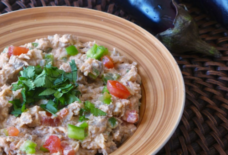SOURCE: YAHOO
BY: LYNN STEWART LIVING
The layered flavors of Moroccan cuisine typically take hours to develop; think of the famous tagines or b’steeya, a savory pie made with saffron-spiced chicken (or pigeon) and sugared almonds. Spices play a big role in that layering, and you’d be hard-pressed to find a Moroccan dish that doesn’t include a good measure of them. We talked to the experts at the Spice House, a purveyor of spices, herbs, blends, and extracts, to find out which are the essential for Moroccan food.
Ras el Hanout
This must-have spice mix in the Moroccan canon typically consists of more than a dozen ingredients. Among the more popular ones are cardamom, cumin, cloves, cinnamon, nutmeg, mace, allspice, dry ginger, chili peppers, coriander seed, peppercorn, sweet and hot paprika, fenugreek, and turmeric. Cooks use it on poultry, fish, vegetables and couscous.
Turmeric
Golden in color, with a mustard-like taste, turmeric adds an earthy and mildly astringent flavor. Its pleasant heat also adds color to tagines.
Cinnamon
With its assertive flavor and spicy heat, cinnamon is a key player in the Moroccan kitchen. Sri Lankan cinnamon has a delicate and floral taste and is ideal with meats and dried fruits in slow-cooked tagines.
Ginger
Dried and ground ginger has an unmistakable zing and a slightly sweet flavor. You’ll find it in tagines and couscous.
Saffron
Yes, saffron’s expensive, but the pros at the Spice House say it’s worth it—and that if you find a cheap version, it’s probably not really saffron. Unlike most other spices, saffron threads will last for years if stored in a dark pantry, and they add an unmistakable golden color to many classic Moroccan dishes including Couscous Royale. Moreover, taking a pinch of unbroken threads and lightly crushing them in your hands into a small amount of hot liquid is “culinary romance not to be missed.”
Paprika
There are many types of paprika on the market; for Moroccan cooking, unsmoked paprika of any origin will work. Its deep character and mild sweetness is especially nice in dishes that also feature tomatoes or eggplant, and in this potato dish.









